Latest News
20 September 2019
Brand new laboratory for research into sustainable electricity supply
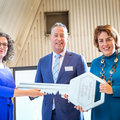
In order to achieve the climate targets, the Netherlands needs to generate much more electricity using the sun and wind. But is our electricity network even ready for that? Unfortunately not. In order to tackle this gigantic challenge, TU Delft is currently building a brand new laboratory: the Electrical Sustainable Powerlab, aka the ESP Lab.
19 September 2019
TU Delft 37th in QS Graduate Employability Rankings 2020
The QS Graduate Employability Rankings 2020 puts TU Delft 37th in the world, up from 41st position last year.
16 September 2019
The Netherlands as an international centre for Quantum Technology
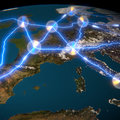
State Secretary Mona Keijzer received the National Agenda on Quantum Technology directly from Robbert Dijkgraaf this afternoon.
12 September 2019
Surgeons use octopus-based mechanism for the first time in OR
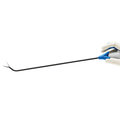
The ‘mechanical octopus’, a steerable laparoscopic instrument used for minimally invasive surgery in the abdominal cavity, has been used for the first time in an operating room.
11 September 2019
TU Delft in 67th place in THE Rankings
In the latest Times Higher Education World University Rankings, TU Delft has dropped nine places from last year and now shares 67th place. Since 2014, TU Delft's position in the rankings has fluctuated between 71 and 58.
11 September 2019
Growing Biotech Campus Delft with extra jobs and companies

In order to accelerate the development of Biotech Campus Delft into a hub for open innovation in industrial biotechnology, DSM, the City of Delft, TU Delft, the Province of Zuid-Holland and InnovationQuarter have signed a letter of intent
11 September 2019
Cable bacteria: Living electrical wires with record conductivity
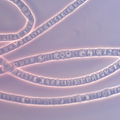
Bacteria that power themselves using electricity and are able to send electrical currents over long distances through highly conductive power lines. It almost sounds like the way we charge our TVs and refrigerators, and may seem hard to believe, but it is a recent discovery by a team of scientists from the University of Antwerp (Belgium), Delft University of Technology (Netherlands) and the University of Hasselt (Belgium). Centimeter-long bacteria from the seafloor contain a conductive fiber network that operates in comparable way to the copper wiring that we use to transport electricity. The highly conductive fibers enable a completely new interface between biology and electronics, providing a prospect for new materials and technology.
10 September 2019
TU Delft and VU Amsterdam students break cycling world speed record with 122.12 km/h
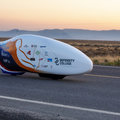
The Human Power Team broke the women’s world speed record for cycling.
05 September 2019
Rapid snow retreat amplifies North Greenland mass loss

Researchers show a large regional difference between melt in North and South Greenland.
03 September 2019
ERC Starting Grant for five TU Delft researchers
The European Research Council (ERC) has awarded five Starting Grants to scientists from TU Delft
